HDD vs SSD - which is the storage tech for you? | PC Gamer - beckerluffird
HDD vs SSD - which is the storage tech for you?
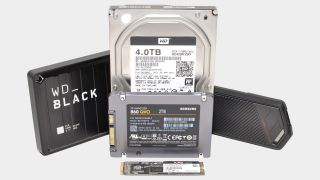
The HDD vs. SSD storage war is over. A modern PC gamer should non be loading the mass of their games from a standard disk drive; you simply won't get the most out of your system. And arsenic console tech catches up with solid storage of its own, progressively next-gen games are going to expect you to use an SSD.
The consensus is that solid-land trumps—pricing's downcast, speeds are leading, and next-gen consoles are even sporting big SSDs. Simply that doesn't mean in that location isn't still a commit for a good ol' fashioned spinning platter in your PC, especially with prices plummeting on 12TB hard drives and the like.
Solid drives (SSDs) have been getting pumped up o'er the past 10, reaching the stage where it's hard to imagine victimization a spick-and-span PC that doesn't at least let in some form of SSD storage. Hard drives (HDDs) are the old guard, having been more or less since the front 5MB model in the 1950s, with sizes now reaching 20TB.
It's not an all-surgery-nothing decision, thankfully. Some of United States may tactile property that the HDD is dead, but that's more of a personal take than a universal truth. When comparing HDD vs. SSD, the main departure comes down to price vs. performance. Even the best SSDs still cost 9 cents per GB or more, while HDDs start below 2 cents per GB. That's over fourfold the price for the unvarying amount of storage capacity, but running Windows on an HDD makes your all PC feel inert. SSDs are just then much faster for booting Windows and introduction your favorite applications.
Thanks to decreasing prices, many another prebuilt Microcomputer manufacturers are skipping the HDD entirely. Ship a PC or laptop with a 1TB SSD, and about users will have many than sufficient storage. You can easily add secondary storage for desktops in the form of a spacious HDD if needed, piece many laptops will bear to face at outside storage devices. There are inexpensive elated-speed USB SSDs that tail end still outperform an internal HDD, and newer NVMe SSDs offer even more tremendous gains in performance.
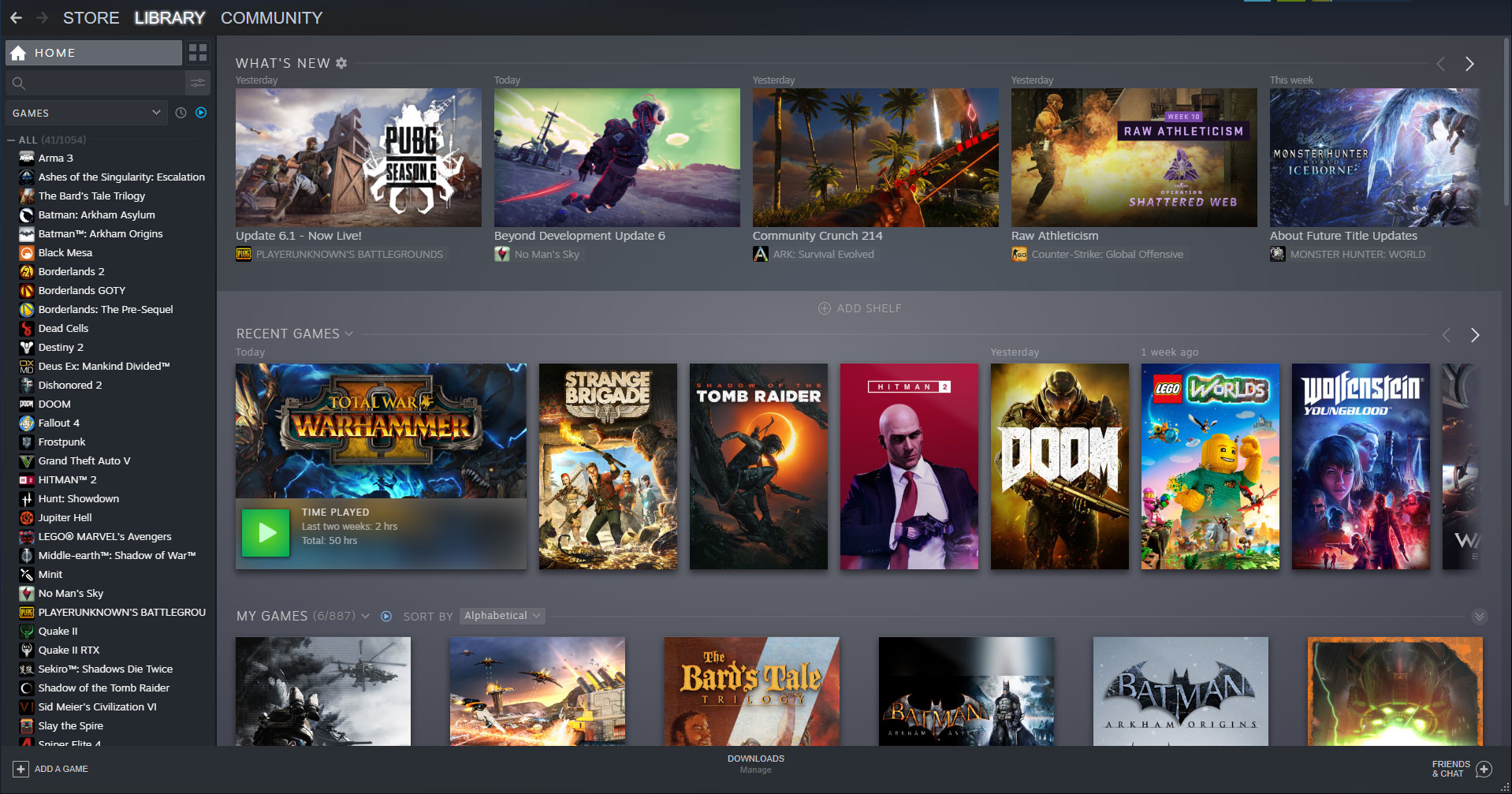
HDD vs SSD: The increasing size of games and other information
Equally anyone with a member back subroutine library can attest, modern games storage requirements know no boundary, with original games including updates and add-ons easily pushing sprouted to and in some cases beyond the 200GB mark—looking you, Call of Responsibility: Red-brick Warfare.
With the PlayStation 5, Xbox Series X, and Xbox Serial S making a point of including barred SSD storage, the shift is prospective to result in another monumental spike in AAA titles' size of it. Games in the next generation will likely rupture 150GB, and some already have.
Where 40-60GB install sizes utilized to Be typical, large modern games often weigh in at all over 10GB currently and frequently climb to more following the release of patches, seasons, and updates. That's one-eighth of a 1TB SSD! The complete news is that a 1TB-assort SSD can be had for $100, so you're 'only' dedicating about $10-$15 of storage to flush the giant games. But if you keep a whopping assemblage of games installed, that 1TB tin go fast.
It's non all just merriment and games, however. Consider traditional backup and media storage. There's no need to back up your PC to superior SSD storage. Should you need to restore from a backing, sure, it could save you several minutes, but restoring from a backup in the first place will be far more than itchy. Given the enduringness and reliability of modern HDDs, they're calm the single best solution for backing in the lead your precious data.
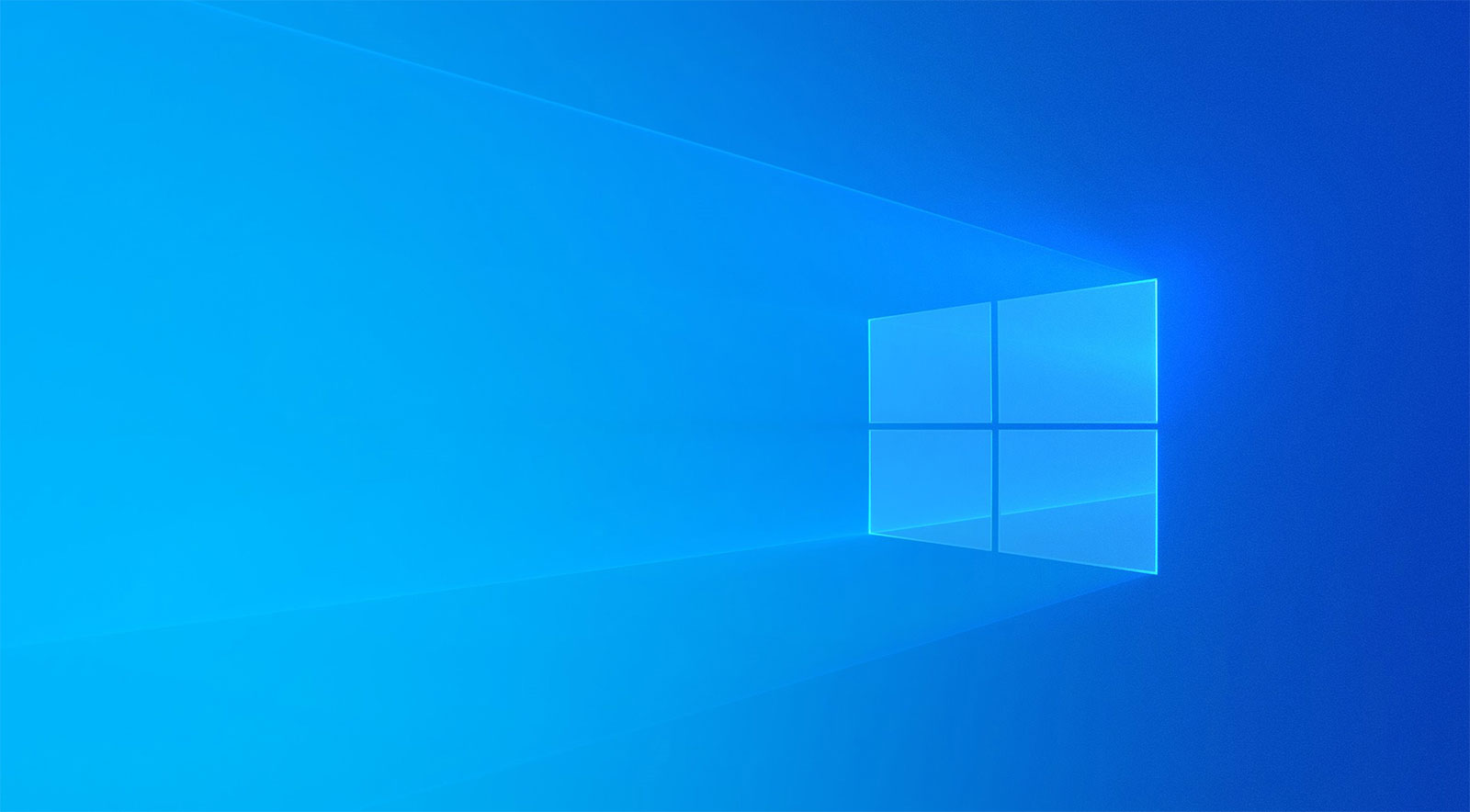
HDD vs SSD: Having an SSD for your boot drive is essential
There are multiple reasons SSDs are faster than HDDs. There are no riding parts or spinning platters, making access times substantially quicker, almost instantaneous in or s cases. That means SSDs don't stomach from debased performance referable file fragmentation (where a charge gets located in non-sequential sectors).
On a hard drive, the heads have to storage the castigate sector to read each fragment and then wait for the right part of the platter to spin under the movement straits. Atomic number 3 files get left-slanting, edited, and deleted, over clip, this stool slow kill access code to information on heavily drives, especially for things like booting Windows.
With a clean Windows 10 physical body and a fast WD Black 4TB HDD, bang times (from the end of the BIOS POST sequence to being at the Windows 10 background) can take 20-30 seconds. Along a slower WD Blue 2TB HDD, under the unvaried circumstances, boot times are typically 30-40 seconds. And for conscionable just about whatsoever good SSD, booting in well under 10 seconds is typical.
We've said it before: victimisation an SSD for your boot drive is one of the most noticeable upgrades you can clear happening an older PC. Many people (including most of us at Microcomputer Gamer) defy to use a PC that doesn't bear an SSD boot drive. Information technology's just not cricket.
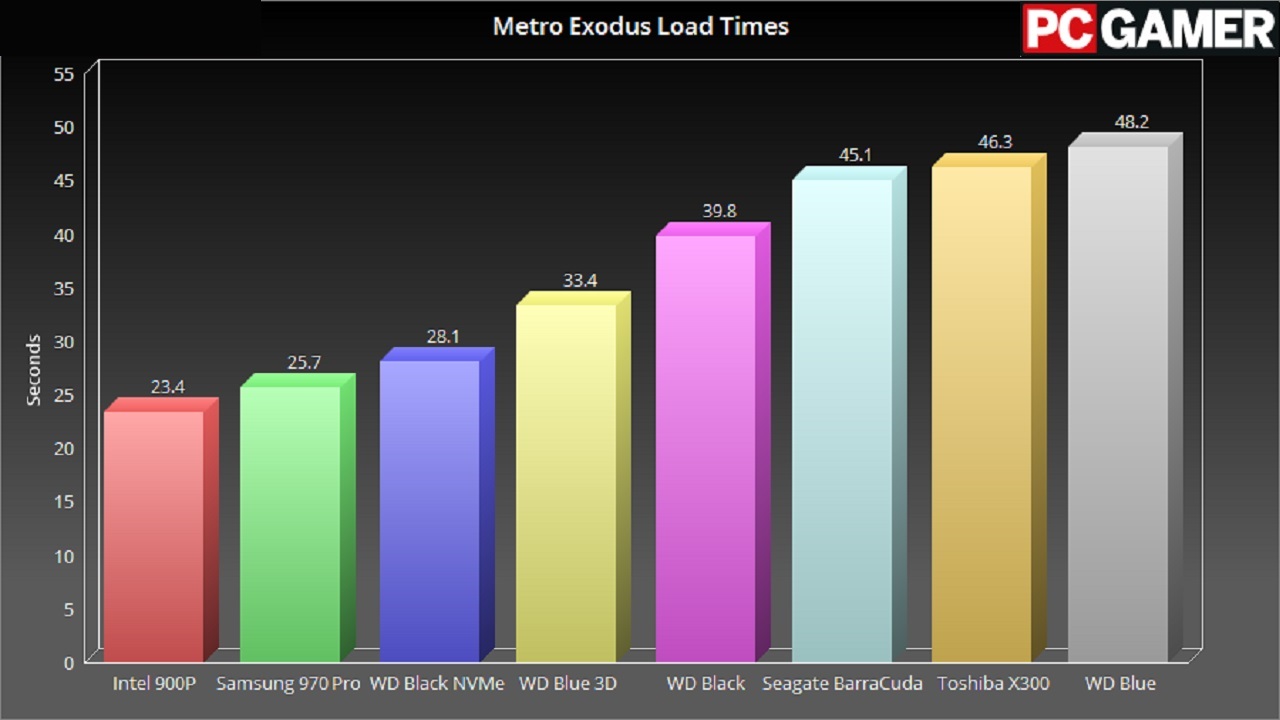
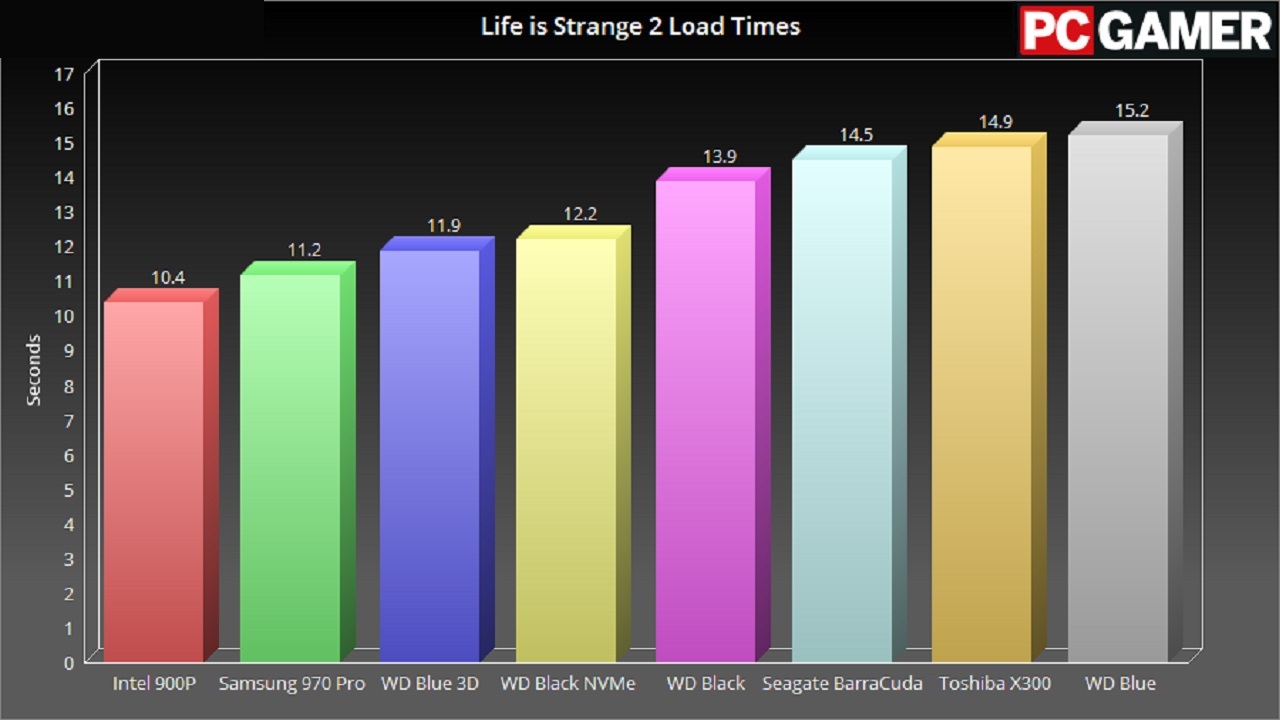
HDD vs SSD: SSD performance gains in games aren't that staggering
Windows boot times are one thing, but games run to acquit differently. There's a great deal of sequential data to read, and usually, you'rhenium not running a ton of else stuff in the background that's hitting your storage. The applicable difference for gamers between SSDs and HDDs International Relations and Security Network't as take care-blowing as the hyperbolic marketing copy from manufacturers would have you believe. It's beyond question not imperceptible, but we're talking in terms of seconds kind of than minutes.
Testing a range of meridian SSDs, including add-in cards, NVMe, and SATA drives, against the best of a crop of 7200 RPM HDDs in Metro Exodus produced some significant results. Exploitation the RDY ELIBG205 as a testbed (packed with a powerful Geforce RTX 2080 Ti and Core i9-9900K) and loading into the Taiga segment of the primary campaign, the slowest of the HDDs (a Westerly Appendage Puritanic 1TB) took fair-minded over 48 seconds to cause us in-game, with the most fleet of the HDD pack (Western Digital's 2TB Black) consignment gameplay in 40 seconds. On the SSD lateral, the apical-performing 480GB Intel Optane 900P card card delivered Taiga in just terminated 22 seconds, spell the slowest of the SSDs we proved, the 500GB Western Integer Blue 3D SATA, took just clear of 33 seconds.
Those results might look pretty stark if you'Re considering the best effect against the worst. However, a higher-remnant Optane AIC is ridiculously overpriced, and we'd stick with something more sensible, like the XPG SX8200 Pro, which is nearly as double-quick. Contrast that with the WD Black 2TB: 16 seconds longer to load Metro Exodus, with twice the storage electrical capacity and a lower price.
Testing reveals an even narrower gap when you consider indie titles. To gather some information from a lightweight independent game, we tested all eight drives against piles in the forward episode of Life: Strange 2, and even the fastest of our SSDs roundup shaved a mere ~5 seconds offloads compared to the slowest HDD. If you're mainly playacting smaller independent or 'double-A' games, upgrading to an SSD is unlikely to impingement your play experience markedly.
Obviously, if you have the cash and want top-performing hardware, SSDs will always beryllium the better solution, especially if you don't want to living your friends wait in the lobby. But if you're more interested in value, HDDs look pretty attractive, even with TLC and QLC flash storage continuing to slip in price.
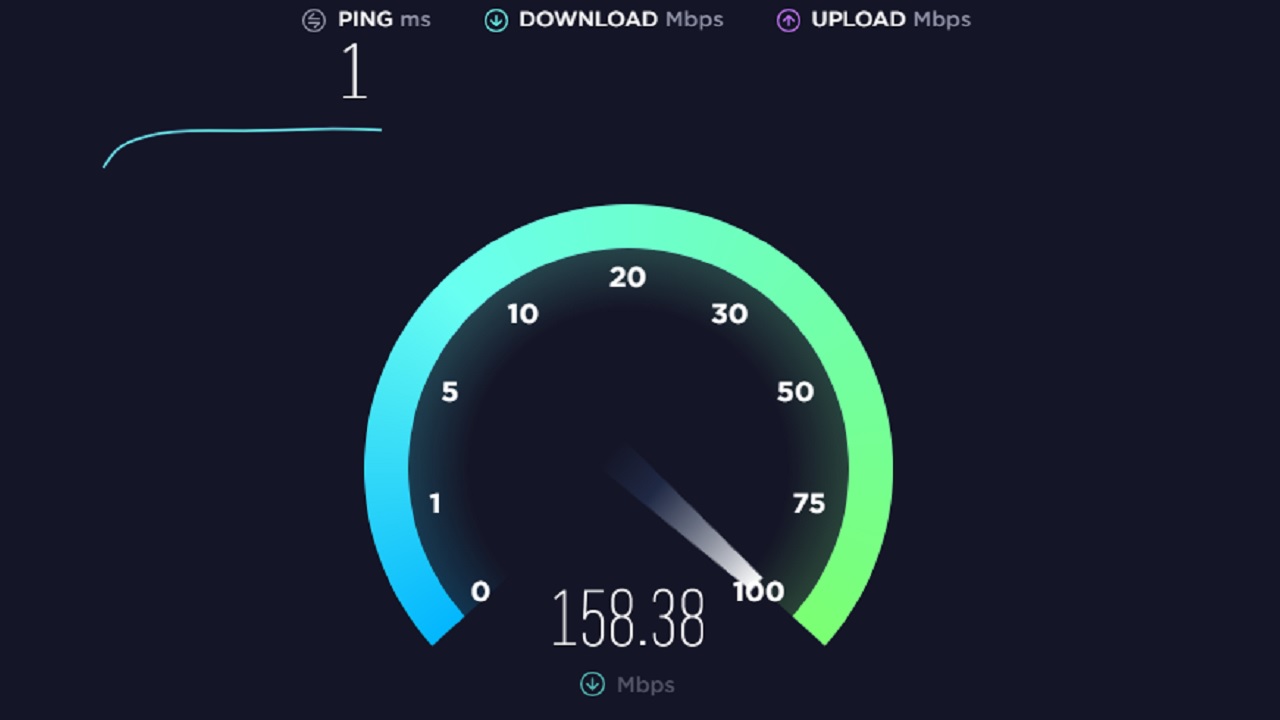
HDD vs SSD: Network considerations
If you'ray living under the Stalinism of a data pileus, this decision has belik already been made for you. Having to perpetually redownload games in the shambling that's inevitable with just a single, limited capacity SSD immensely expands the value of capacious HDDs if you're working with finite bandwidth. The same is true if you live in an area with poor internet connectivity. If a unwed AAA title takes an entire night to download, it can follow a real deterrent to jumping back into older titles or fetching a probability on unexampled ones when information technology means having to clear movement space.
Even if you live somewhere with sturdy, reliable, blindingly blistering internet, when you compare the length of time IT takes to download titles against the slender moments you save in terms of payload times, there's non much difference, particularly in shorter or well-optimized games. Naturally, you may count that clock otherwise, doing something else piece a gage downloads compared to the time you're restlessly seated, comptroller/mouse in hand while you're waiting to play. Still, in price of raw time saved, at that place's not a tremendous overall difference.
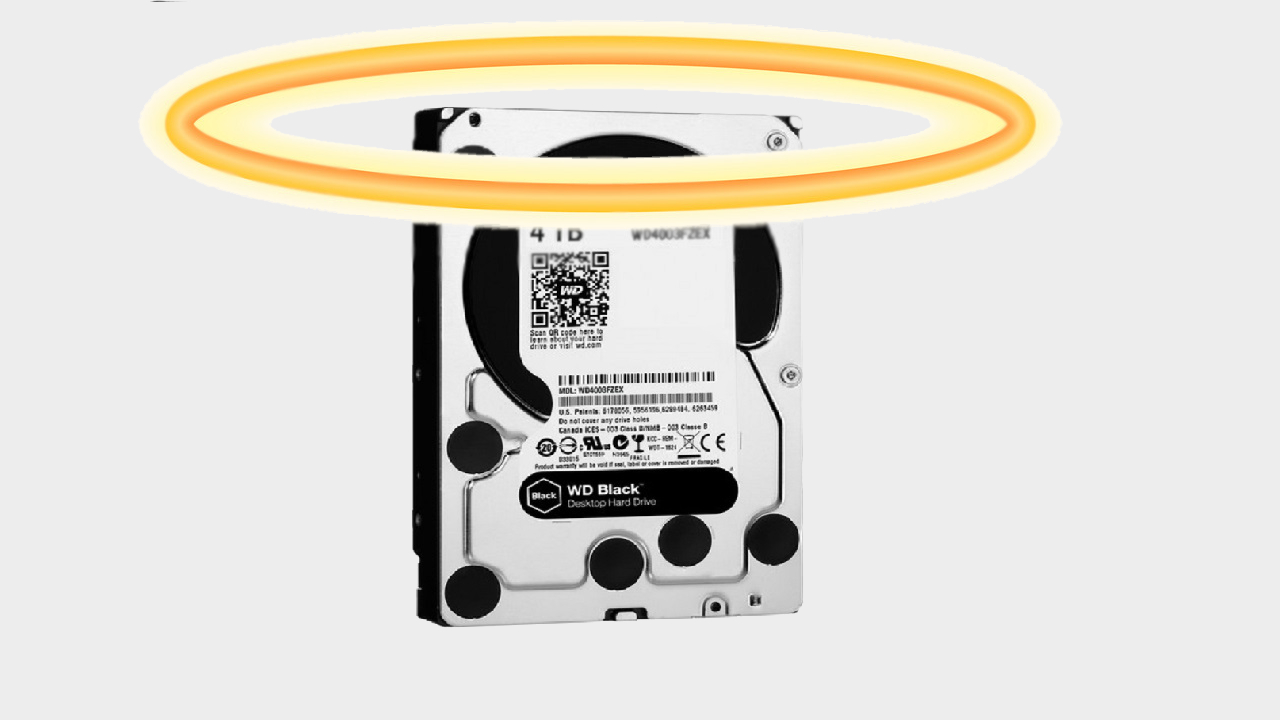
HDD vs SSD: The hybrid storage solution
Budget will always atomic number 4 a major thoughtfulness when you'atomic number 75 choosing whether or not it's time to transfer completely to an SSD lifestyle—in a world where you have access to unlimited discretionary income, course, SSDs are the frank option, as you posterior afford to hatful them in multiples and surround them with the hardware to support them. But for the financial mortals among the States, HDDs still have a lieu.
Eve if you neediness an SSD for your boot drive (and you should), nabbing a cheap and capacious HDD for secondary or tertiary storage is arguably the advisable approaching to a sometimes complex discussion. Use it for mass storage, most of your games subroutine library, videos, backups, and more. You can still put few games on your SSD as well, but there are plenty of files that get into't need SSD speeds. We'll equal the first to wanted the solid-state future with yawning weapons system, simply keeping a large HDD handy still makes sense.
There are other alternatives to just a pure HDD Oregon SSD setup. Intel Optane Memory Provides a expedited SSD cache that supplements your HDD, and you don't need to worry about which data gets to reside on the faster cache—the software and drivers mind of that for you. AMD's StoreMI (a branded variant of Emotus FuzeDrive) takes a slightly different approach, with layer storage. You get the awash capacity of the HDD+SSD, with the drivers and software program managing where information is located.
Concisely, the debate over HDD vs. SSD storage isn't over just yet. SSD capacities are increasing, and enterprise solutions can store raised to 100TB connected a single drive. That's five times larger than the current top HDDs. However, the toll for such drives isn't even worth mentioning (*cough* $50,000 *cough*). We're unmoving a longstanding way dispatch from SSDs actually beating HDDs at a price per GB, and until that happens, HDDs will remain a viable option for many people and businesses.
Source: https://www.pcgamer.com/hdd-vs-ssd/
Posted by: beckerluffird.blogspot.com



0 Response to "HDD vs SSD - which is the storage tech for you? | PC Gamer - beckerluffird"
Post a Comment